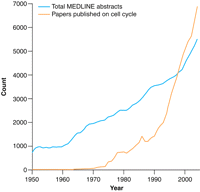If you are like me, you will have said, “what on earth is an ontology?” Some form of scientific anthology? Well, I first came across the word “ontology” here, a post in which Professor Michael Wesch from Kansas University said/wrote that “Ontology is overrated.” While the term remains somewhat esoteric, I am ever more conscious that the ontology concept will catch on, albeit limited to the domain of knowledge acquisition and storage. So, what is an ONTOLOGY? In a geeky paradise, ontology is the new portal. Ontology is the metier of the 21st century librarian.
As defined in the Wolfram Alpha search engine, ontology in an organizational sense, “is a rigorous and exhaustive organization of some knowledge domain that is usually hierarchical and contains all the relevant entities and their relations.”
A recent report by University of Illinois professors & researchers, Allen Renear and Carole Palmer, published in Science (14 August 2009), an article entitled, “Strategic Reading, Ontologies, and the Future of Scientific Publishing,” in which they describe and measure the effects of the web on medical research. Broadly speaking, the article highlights the gargantuan rise in the number of articles published, the increased number of articles being read (by fellow researchers, etc.) and the average amount of time spent on reading each article (decreasing). On the one hand, there are the obvious benefits of providing, instantaneously, potentially life-changing medical information anywhere around the world. However, the presence of so many articles poses an ever greater challenge for researchers needing to claim authorship (i.e. original ownership) of an idea or a discovery. (See Illinois News writeup).

As information proliferation will continue (in the short term it will undoubtedly continue to accelerate), the need to rationalize, filter and digest information will become critical not only in the domain of science, but in many more areas including arts and business. As Renear says, “efficient strategic reading becomes increasingly critical in scientific work…” and I say that the same will be true in many other areas, too.
Here is the BEAUTIFUL concept behind the ontologies being crafted in wiki fashion around the sciences (and later to all areas of documentable expertises): they have inverted the way research is done. You search for the real information you are looking for and then follow up by reading the supporting article(s) as opposed to reading the article to find the information for which you are looking. Of course, that means less reading per article, but it also saves an immense amount of time on background information (and, often-times, noise). The next step would be integrate into these ontologies semantic web concepts, to make them ever more effective and efficient.
Some examples of ontologies out there:
The Gene Ontology is apparently the most famous of ontologies, and among the ones I found while trolling ontologies on google, is certainly the one that speaks volumes to me.
The Open Biomedical Ontologies, a collection of freely available well-structured controlled vocabularies. When you read the introductory paragraph on this site, you get the feeling of not wanted here, very quickly. Try this for size: “The OBO Foundry is a collaborative experiment involving developers of science-based ontologies who are establishing a set of principles for ontology development with the goal of creating a suite of orthogonal interoperable reference ontologies in the biomedical domain.”
And, a third example that is a little easier to get one’s head around, an Animal Behaviour Ontology, one set in motion by Darwin undoubtedly…!
Anyway, as the world progresses through the 21st century, I expect many other areas — less technical than science — may benefit from the knowledge accumulation and classification methods inherent in these sort of wiki-library ontologies. The discussion on ontology takes on a whole other layer when we take into consideration the ongoing “battle” for the digitalisation (numerization) of the world’s books — truly a new métier for the 21st century librarian. And, the way the Google Books system works is very similar in look & feel to the various ontologies: find the researched term, then open (or pay for?) the whole text…
Will ontologies play a significant part in knowledge management systems? Can ontologies move into the mainstream? What do you think?










